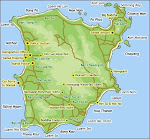 Son, Dominic's description of his durian eating experience, as "Like eating custard in a sewer", lacked the allure necessary for me to want to sample it for myself at that time. But many Thais (and foreigners) describe it in reverential terms as the 'King of Fruits' and eating it, a beautiful, not-to-be-missed experience, although not one easily described for those that haven't tried it. The texture of the aril - the fleshy pulp encasing the (normally five) large seeds - is likened to a slightly fibrous custard. The taste is unique; unquestionably so, as no two descriptions are exactly the same. Custard, almonds with a hint of garlic. Or perhaps: banana, papaya, vanilla, and rotting onions.
Son, Dominic's description of his durian eating experience, as "Like eating custard in a sewer", lacked the allure necessary for me to want to sample it for myself at that time. But many Thais (and foreigners) describe it in reverential terms as the 'King of Fruits' and eating it, a beautiful, not-to-be-missed experience, although not one easily described for those that haven't tried it. The texture of the aril - the fleshy pulp encasing the (normally five) large seeds - is likened to a slightly fibrous custard. The taste is unique; unquestionably so, as no two descriptions are exactly the same. Custard, almonds with a hint of garlic. Or perhaps: banana, papaya, vanilla, and rotting onions.I was interested to learn the impression of a 19th century naturalist, Alfred Russell Wallace, after he ate his first durian in Borneo:
"A rich, butter-like custard highly flavored with almonds, but intermingled with wafts of flavour that call to mind cream cheese, onion sauce, brown sherry and other incongruities. The more you eat of it, the less you feel inclined to stop."
That last line perhaps holds the key. Too frequently a first encounter with durian is in the form of a tiny bite. This small taste only serves as an introduction to an exotic flavour unlike any other one has ever experienced. If we're bold enough to continue until we've eaten an entire piece of fruit, our opinion may change as we becomes more acquainted and learn to discern the depth of its flavour.
I can imagine that encountering a durian for the first time is not unlike encountering Munster, that most smelliest of smelly French cheese. Its vomit-inducing odour a pretense, a mask which acts to fool the senses before tasting what is a delicate and most delightful character. Put another, less laborious way - thank goodness it doesn't taste as bad as it smells.
















Apparantly elephants contribute to enhancing the taste of durians in Thailand .
ReplyDeleteThey roll the fruit on the ground so as to cover the thorns with grass and leaves; the fruit is then swallowed whole and passes through the animal's digestve system, ripening furthur in the process. I think this is some kind of elephant spa digestive tract cleansing treatment. The whole fruit that comes out through the other end is worth its weight and taste in gold!!! Men are said to eagerly hunt for this treasure, unfortunately so do tigers.
If you do get a taste for Durian and eat a belly-full, dont' make the mistake I did and wash it down with a cold beer. Thais will tell you that mixing it with alcohol makes your stomach 'hot'. My stomach wasn't so much hot as highly volatile. It's potentially lethal and took me over 24 hours to recover. (I only had a small singha!).
Useful Durian lore Fiona - many thanks, but they prompt the obvious (to me) question: does the durian's characteristic odour become substituted by that of elephant dung? Which, would you say is preferable?
ReplyDeleteI read about someone's stomach 'exploding' after consuming both durian and copious amounts of booze, but assumed (probably correctly) that the account was exaggerated. Your comments are insightful and most appreciated Fi. I hope to look forward to lots more.
BTW. Congratulations on being the first to comment on any of this blog's posts. Momentous.
ReplyDelete